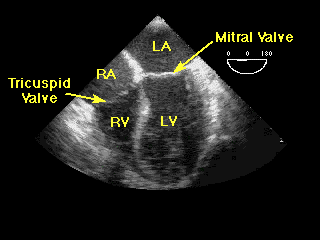Were You Asymptomatic Upon Diagnosis Like Sherri?
By Adam Pick on July 23, 2008
If I had to define the process of being diagnosed with heart valve disease in one word, I would use the word “dislocating”. I’ll never forget my initial diagnosis from Doctor Bad Bedside Manner. And, I’ll never forget those strange feelings of, “Oh my gawwwwd. Is this really happening? Open heart surgery? Am I going to die?”
As you would imagine, I’m not the only patient to experience those dislocating feelings and emotions. What made my situation more challenging to digest… I was almost completely asymptomatic. Of all the leaky heart valve symptoms, I only had one symptom.
Guess what? I’m not the only patient to experience that strange combination of being asymptomatic and being diagnosed with heart valve disease – aortic valve stenosis or mitral valve regurgitation. In fact, I just received an interesting email from Sherri (pictured below with Farah, her dog) about this exact topic.

Sherri writes to me, “Dear Adam – I went from an “IF” to a “WHEN” for valve surgery. I have a bicuspid aortic valve and mitral valve prolapse. My last two echocardiograms have shown that the mitral valve is really prolapsing and severely leaking.
However, I am pretty much asymptomatic. Recently, I noticed a dry cough that comes-and-goes. Since I have allergies, I assumed the dry cough was related to seasonal allergies. However, after reading several blogs and medical websites, I started to wonder if the cough might be a symptom of the prolapse?
At a recent check-up, my current internist did not like the sound of my heart. So, she sent me to a cardiologist. My cardiologists (who are both brothers in practice together) explained to me that “we were going to be good friends”.
I didn’t know what that meant at the time. I have been going to the cardiologists for over two years. I am checked head-to-toe frequently. I even had a transesophageal echocardiogram (TEE) done last year on my aortic valve because they noticed something foreign on the valve. Luckily, that valve is doing okay, with little change.
Unfortunately, the mitral valve has become worse over time. I am now seeing my cardiologists every 2-3 months for echocardiograms. The cardiologists told me that for my next echo, depending on results (if the valve continues to show severity), they may refer me to a cardiothoracic surgeon for further testing and evaluation. If the valve has not changed since my May, 2008 appointment, they will continue to have me come in for monitoring every few months.

I also plan on getting a second opinion. However, even after being misdiagnosed by the medical profession in the past, I really feel at ease with my current doctors. The fact that they took the time to show me my films and sat with me to explain the diagnosis really helped! I feel that my cardiologists have a real interest in me (the patient) not the money (from my insurance company).
This is all so new. The first year after being diagnosed… I really didn’t pay much attention to my condition. But, now I want to learn as much as possible. Since surgery might be in my future.
Again thank you for your time, e-mail newsletter, your blogs and for writing your book. This is one of best websites on the Internet!
Sherri Hendry
(Gaithersburg, Maryland)
|
Paul says on July 23rd, 2008 at 3:35 pm |
|
I only went to the cardiologist to get my wife to quit bugging me about it. I met him at a softball tournament and figured “what the heck, seems like a nice guy and Wendy will quit bugging me.” I had not symptoms and was lifting weights three times a weeks, logging an hour in the pool a week and 20 miles of running. The minute my cardiologist put the stethoscope to my chest he asked if anyone had told me I had a heart murmur, severe at that. Never been told that! After all of the tests, and a second opinion, I am set with Dr. Starnes at USC for aortic valve replacement of a bicuspid valve with severe regurgitation on Sept 2. None of the doctors, techs or even Dr. Starnes can believe I have no symptoms considering the severity of the regurgitation. They had me listen to it and compare it to my wife’s heartbeat and it sounds more like running water than a heart beat! But still no symptoms. Both my cardiologist and surgeon told me I would have met them in the ER within the next two years if I hadn’t come in to satisfy my wife’s concerns. An older internal medicine doctor I saw recommended I wait until symptoms appeared, but even he became a believer after my last echo. So after the Labor Day barbeque, its off to Keck Hopsital! |
 |
|
Bill says on July 23rd, 2008 at 5:03 pm |
|
Glad to hear that they identified the problem and you are scheduled for the operatiion. I also had no symptoms and found it hard to believe there was a need for replacement of the Aortic Valve. My regurgitation was severe but without complications. The doctors all said I would feel much better after the surgery and I was not sure what they meant. However, I was having some physical limitations I was not aware of, and now I have much more strength and vitality. I am 10 weeks post-operation. I am back at work and back in the gym and things are great. |
 |
|
Gina says on July 23rd, 2008 at 7:02 pm |
|
I am now facing surgery for aortic regurgitation sometime this fall, and have also been asymptomatic. It really helps to read about so many people doing well. I’m still in the process of deciding on a surgeon, but Adam’s book is proving very helpful on so many levels. |
 |
|
Becca Allison says on July 25th, 2008 at 6:38 pm |
|
Hey, all, |
 |
|
Rosie says on July 26th, 2008 at 9:55 am |
|
Becca ! |
 |
|
Dave Richards says on July 27th, 2008 at 4:17 pm |
|
I too was asymptomatic for six years following the diagnosis of mitral valve prolapse with moderate leakiness. At the time, my doctors advised that it was likekly that someday I would require surgery to replace or repair the valve. They could not tell me how I would know when the time had come. Six weeks ago while on a business trip, my feet started swelling and I was suffering with severe shortness of breath. The leakiness of my mitral valve went from moderate to severe as evidenced by an echo, with mild enlargement of the heart being apparent. I was a candidate for repair vs. replacement and I set out to find the best reference surgeon that I could here in NYC. Luckily I found him, had both my mitral and tricuspid valves reconstructed, spent five days in the hospital and I’ll be going back to work this week; three weeks after my surgery. Sherri is lucky and blessed to know what she knows. Together with her doctors she’ll be able to find the right path for her successful treatment. |
 |
|
Winona Blake says on July 28th, 2008 at 9:35 pm |
|
Hi, |
 |
|
jerry says on July 29th, 2008 at 12:22 pm |
|
Regarding second opinions, one reason I really like my primary care physician is that when I came back to him with my diagnosis from an ER visit, the first words out of his mouth, were “let’s get you a second opinion.” I wanted one, but I have discovered that lots of doctors don’t really like them, and I don’t know if it’s because they feel challenged or threatened or they don’t like to lose business…. I wasn’t asymptomatic though. I’ve known about my murmur since getting an FAA waiver for it in college, and had had it checked out a few years back at my primary physician’s recommendation. But it did turn out much much sooner than anyone though. Asymptomatic? Not really. More like denial on my part. (I was told there would be no math.) |
 |
|
Becca Allison says on July 29th, 2008 at 6:16 pm |
|
Rosie, |
 |
|
Rosie says on July 30th, 2008 at 10:30 am |
|
WOW !! One week post surgery and you sound wonderful. Thank you for the encouragement !!! I am NOT a sitter, so I am sure after surgery, I will be up and moving soon also. I am sure dragging my posterior at the present time !!! Thank you for all of the suggestions. I have printed them and will put them in my reminder notebook when I go in for surgery as it is great information. |
 |
|
Becca Allison says on July 30th, 2008 at 11:07 am |
|
Rosie, |
 |
|
Sherri Hendry says on July 31st, 2008 at 7:21 pm |
|
Hi everyone! Thanks for all the helpful info as well as the great support and encouragement. It is really appreciated. |
 |
|
Nancy says on July 31st, 2008 at 11:11 pm |
|
Hi Everyone, I also am still asymptomatic even though my cardiac surgeon indicated that I had aortic valve stenosis in the severe critical stage. I am scheduling surgery for November 2008 unless I get symptoms prior to that date. I am enjoying the summer and playing lots of golf. I think there are alot of people that are asymptomatic and then find out just prior to needing surgery. I had a heart murmur my whole life but only went to a cardiologist after I complained about hearing my heart beating loudly in my ears at nighttime. Glad I went to the cardiologist and will end up having the surgery almost 1 year to the date of being diagnosed. Still no symptoms. I agree with get it done before any damage occurs. Take care everyone and good luck to those having the surgery soon!! |
 |
|
Shell says on August 21st, 2008 at 6:21 pm |
|
Hi all – I had an echo done to rule out a hole in my heart for another issue and that’s when the Dr found that I had a bicuspid aortic valve. She said that there is a little of blood leakage, but not too much to be worried about. I have a little arrhythmia, but she said that was normal. I go back in a year to get another echo. I’m 30. Is this something to worry about, or get a 2nd opinion about? |
 |
|
Marion Crow says on September 3rd, 2008 at 7:17 pm |
|
Hi All I’m now 8weeks after my surgery for a mitral valve replacement. I had no idea that there was any heart problem until I ent to see my General Practitioner (GP) because I had noticed mised hert beats when checkin mypulse rate at the gym. I am a nurse and know that this is not necessarily a problem. On checking my heart my GP asked if I knew I had a murmur – I did not – and she was concerned about this but not the pulse rate. I made an appointment with a cardiologist but 2 days before I was lifting several parcels of books onto the Post Office counter and experienced some weakness; recovering while the postage was worked out. However I felt tightness in my chest which conrinued until after I had been at work for nearly an hour so my boss, also a GP, sent me in to hospital as an emergency. I was admitted for 2 days during which time most of the tests were run. The Dr then came and told me that I had a moderate/severe mitral regurgitation ahich needed replacement but I was too fit to get it done in the public system! I was to be sent home with 6 monthly checkups and further decisions would be made accordingly. |
 |
|
Marion Crow says on September 3rd, 2008 at 7:46 pm |
|
Dear Adam I would appreciate permission to use some of the information in your book with acknowledgement to you. I haven’t yet started to plan how I would approach this task but I will have access to personal stories from NZ patients. I discussed my desire for this project with a cardiac nurse specialist here in Christchurch. You may be interested to know that in the South Isalnd of NZ there are cardio-thoracic nurses who work on the district following up and caring for patients in their own homes. I had several visits from my local nurse during the first 2 weeks after discharge from hospital. This was really helpful for encouragement and advice for myself and my carers. She assessed the level of my pain relief at her first visit, the day after arriving home, and arranged further medication with my GP. That made a huge difference to my ability to get moving. Her regular visits included a check on blood pressure, heart rate, lungs and asking whether there were any problems, how was my INR level and warfarin dosage. The weather was so wintry and wet that outdoor exercise was almost impossible – so walking up and down the hallway was the only exercise available until I returned to my own home with the loan of an exercycle. We are now beginning to see some warmer weather with Spring approaching and I am enjoying being able to do some gardening for the first time since before Chrstmas. I am planning to return to work in 3 weeks as a part time administrator. Thank you again for you helpful book and blog. |
 |
|
Sherri Hendry says on October 26th, 2008 at 8:40 am |
|
Hi everyone, Thanks for all your valuable input! Just an update, I have been referred to a surgeon due to my MVP status. An Echo in September revealed that the leak has increased from 4.2 to 4.4 in 3 months. My cardiologist feels that now is the time for the repair. Said in general my heart is in good shape and had not started to dialate. The chamber however is starting to show signs in enlargement. With that being said, he stated I was a good candidate for the Da Vinci procedure which is what I had preferred if at all was possible. I am now working on my appointment w/ a surgeon my cardiologist recommended for this procedures. I’m lucky because at this point I am going in for a repair (pending surgeon’s review) and not a replacement. My cardiologist feels that fixing the valve now before it becomes too damaged to repair is a good thing. And I couldn’t agree w/ him more. My Biscupid aortic valve is still functioning normally. No leakage or sticking. I feel truly blessed – for that and all of you as well as Adam. Thanks to everyone. Sherri |
 |
|
nancy mallinger says on October 27th, 2008 at 9:26 pm |
|
Hello everyone!! |
 |
|
Lisa Darr says on October 28th, 2008 at 1:14 pm |
|
I am 35 years old and very active. I was diagnosed with MVP with regurgitation at the age of 12. I have never noticed any syptoms, but am now facing either MV repair or replacement depending on what the surgeon can make work. I am an ER nurse at a busy county hospital, a snowboarder, and a cyclist, and never have had anything slow me down until I found out I need surgery. The anxiety is almost unbearable. My heart fuction is down and some dilation was noted on a CT scan and TEE. I do not want to have any further damage to my heart, and I know recovery is better when people are more fit… but it is a lot to absorb. Looks like surgery possibly in December. There does not really seem to be much available in this area for minimally invasive surgeries in this area, and I do not think I want to travel, I want to have as many friends and family as I can. Really glad to have found this site and I read the entire book the moment it hit my doorstep. Thanks to all. -Lisa |
 |
|
Melissa McAuliffe says on February 11th, 2011 at 12:38 am |
|
I am a 54 year old RN with moderate Mitral and Tricuspid valve regurgitation…just diagnosed today. I’ve been dealing with slight nausea and occasional dizziness and feeling fatigued. The fatigue has been for years as I was diagnosed with fibromyalgia..now I’m wondering how long I’ve had this. I still have the muscle weakness and tenderness attributed to the fibromyalgia, but the fatigue is all encompassing recently. I think I’m in denial and I know my finances can’t take major surgery. Even with insurance since it’s HUGE deductible and out of pocket first. |
 |
|
Merilee Brown says on February 11th, 2011 at 4:45 pm |
|
I am 64. I had AVR in late October 2010. My valve was replaced with St. Judes Mechanical Valve. I am on coumadin and I am not going bald. I have great energy. I am attending aerobic water exercise class for an hour 3 times a week and I walk as weather permits. I can do an hour easily. I have a full time busy job. I babysit my busy twin grandsons on the weekends. |
 |
|
Melissa McAuliffe says on February 12th, 2011 at 8:55 pm |
|
So the doctor finally returned my call regarding concern about infection causing the mitral valve problems. He just said see your GP and it is probably nothing. And oh by the way Mitral Valve prolapse is very common and nothing to worry about! So now I’m worried about nothing? And I also feel more short of breath than usual, but again not sure if it’s just nerves. I’m going to watch my diet and make sure the sodium is low. My B/P is already fine again and I have not peripheral edema so I’ll wait the 6 months he suggested for a recheck…. |
 |
|
Allen Raasch says on February 3rd, 2012 at 10:55 pm |
|
Approx, 5 yrs ago, I had an aortic valve replacement using a procine valve, It now seems that I am a candidate for another replacement due to calcification. I am now 71 yrs old. |
 |











